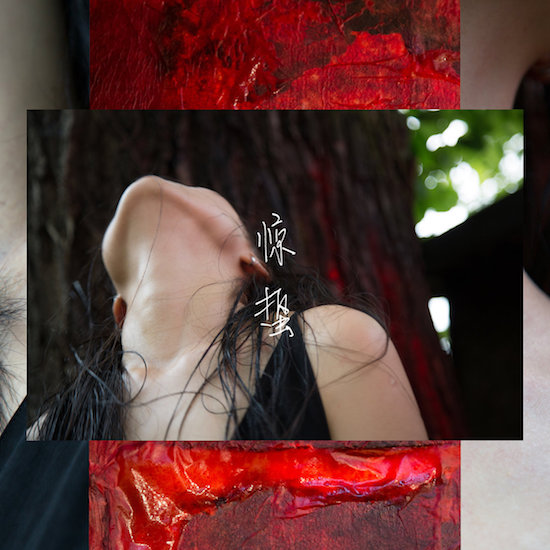"Noise music is listening music. It requires some certain kind of strength": Pan Daijing’s sentiment is clear, in her interviews and in her debut full-length release Lack惊蛰. The album is challenging, and makes for a fitting addition to the output of its label, PAN, which thus far includes work from Rashad Becker, Valerio Tricoli and Florian Hecker.
Delicately assembled but incredibly visceral, Lack惊蛰 is built on a host of seeming contradictions. It is the culmination of two years of performances, improvisations and field recordings, but as Pan’s first full-length album it’s also an indication of what we can expect next. Lack惊蛰 has a sonic sensibility that is brutally blunt and also incredibly restrained – at least for an artist capable of unapologetically shredding egos to bits, as heard in the fantastically abrasive (and aptly named) ‘Very Uncomfortable, Please’ from January’s Vectors 3 compilation. Lack惊蛰, while maintaining a sense of the grossly intimate, is a departure from the near-ecstatic throttle of her techno-veering output.
As revealed in the distance between her more club-oriented work and her contribution to PAN’s recent ambient compilation Mono No Aware, Pan is capable of a wide sonic reach, which Lack惊蛰 signals toward but doesn’t fully inhabit. In certain ways, the record harks back to her 2015 release on Noisekölln Tapes, Sex&Disease, but Lack惊蛰 feels more considered. After this year’s delightfully dark techno release on Bedouin Records, A Satin Sight, Pan asserts a reminder of her more taxing output.
The record opens with the sparse ‘Phenomenon 现象之间’ – an airy assemblage of plucked strings, an operatic warble and synth twitters. It gently introduces the record’s unique chafe. The lilt of ‘A Loving Tongue 恋爱之舌’, along with Pan’s particular timbral manipulations, faintly recall the work of Rashad Becker (who mastered the album).
‘Practice of Hygiene 洁净之用’ is, as you might expect, unsettlingly intimate – the artist has likened sonic affect to BDSM. She issues a collage of murmurs, whispers, sighs and groans and, as the track progresses, the once-graspable sounds degrade into animalistic cries. It’s ASMR for hesitant masochists.
With a tightly restrained kick beneath a noisy growl of a drone, ‘Act of The Empress 皇后之作’ is a clever marriage of sonics run rampant and tight uncompromising control. Though it most recalls Pan’s dance-oriented output, the mere idea of hearing it in a live context is enough to make one’s intestines clench. ‘Come to sit, come to refuse, come to surround 来’ complements it, subtly dodging the ear at every step.
‘The Nerve Meter 神经之量’ pokes and prods the listener, skipping across dissonant intervals, detuned enough to be semi-nauseating and semi-maddening as the loop spins on. To listen is to stomach its monotonous lilt. ‘A Situation of Meat 血肉之状’ stubbornly scrapes and winds its way through the brain.
It’s difficult to determine a fitting environment in which to hear Lack惊蛰 in all its uncomfortable glory. To listen to it in London in the summer is to experience a peculiar chasm, one almost theatrical. Most of the track titles are more or less bilingual translations, ‘惊蛰’, or jingzhe from the album’s title means something along the lines of ‘awakening’; it signifies the largest lingual split, and indeed the album signals a split, a jolt from the mundane.
Pan herself states that the pieces that comprise the album “didn’t feel like tracks” by the end of her process, and became “more like a psychoanalytical process”. With references to “the theatre of our minds,” her intent becomes further clear; she cleverly plays with absurdity.
Lack惊蛰, assembled from an array of visceral groans, moans and dizzyingly detuned descents, is a reassertion of Pan Daijing’s sonic capabilities. Delicate and carnal, it sits well alongside her previous work, from the confrontational "near-asphyxiating brand of techno" to the more digestible ‘Zhao Hua’ (with HVAD). Across spheres of contemporary art, experimental music, noise and techno, Pan’s twisting trajectory as an artist is rousing to witness; Lack惊蛰 serves as yet another reminder of her thrill.


